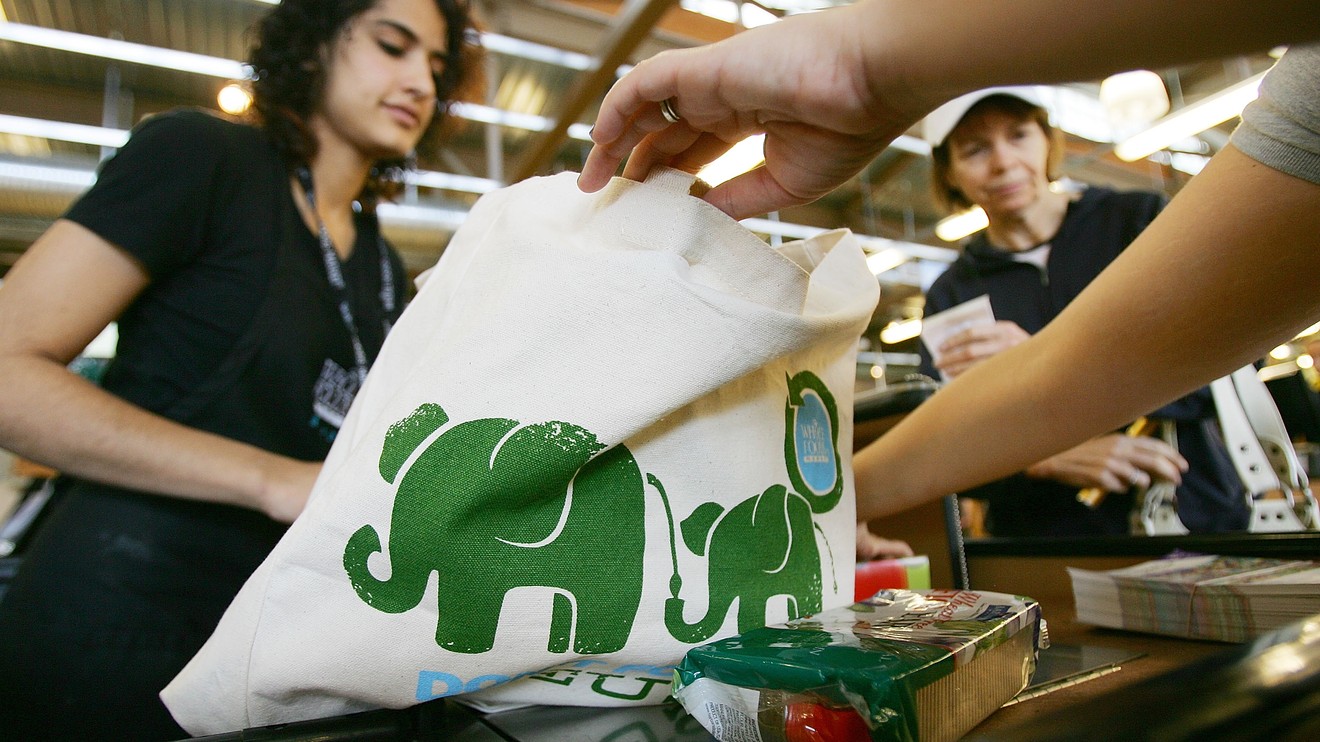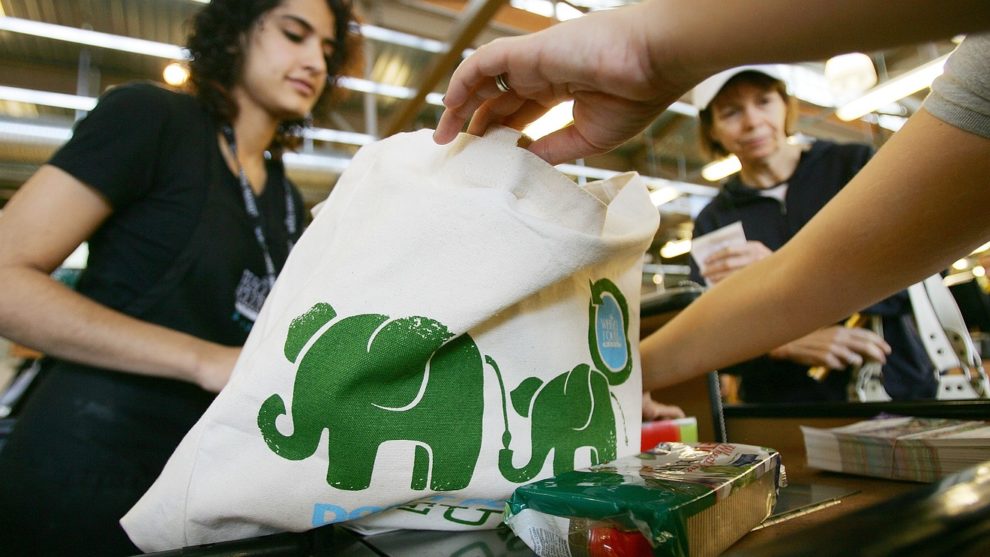
Illinois grocery stores are temporarily banning reusable bags, Gov. JB Pritzker said over the weekend, only the latest elected official across both political parties taking steps they believe will lower risk from the coronavirus pandemic.
But is leadership there and elsewhere opting for extreme caution to fight the deadly disease at the expense of science and consumer trends? The Centers for Disease Control and Prevention offers no specific recommendations about reusable bags and coronavirus.
For Chicagoans, the tote bag ban means they can’t avoid the 7-cent tax per plastic or paper bag applied at the checkout, a program meant to reduce waste and net the cash-strapped city more than $5 million per year in revenue. The state, with Chicago pegged by the surgeon general to be another hot spot for disease spread, isn’t alone with its bag policy.
Maine Gov. Janet Mills was quick to heed the social-distancing policies that scientists overwhelmingly recommend to halt COVID-19’s spread and she moved even faster to delay the state’s soon-to-be-implemented ban on single-use plastic bags, Emily Akin, creator of the Heated environmental newsletter, stressed. New Hampshire Gov. Chris Sununu has prohibited shoppers from bringing reusable bags to stores to protect vulnerable workers, so has Massachusetts Gov. Charlie Baker, to name a few. As coronavirus news spread, the Wall Street Journal editorial board reupped its support of reversing plastic-bag bans and related taxation.
The newspaper isn’t the only entity leveraging the pandemic to make a policy point. Earlier this month, the Plastics Industry Association asked the Department of Health and Human Services to make a national pronouncement supporting single-use plastics and advocating against reusable grocery bags, claiming they will worsen the pandemic because they can carry and transmit coronavirus for longer.
“As the coronavirus spreads across the country, single-use plastics will only become more vital,” Plastics Industry Association President Tony Radoszewski said in a statement, citing what the trade group said are several studies in their favor. “We live longer, healthier and better because of single-use plastics.” Lauded for their relative cost and flexibility, Americans use 100 billion plastic bags a year, which require 12 million barrels of oil to manufacture, says the Center for Biological Diversity.
Related: Plastic is not the ‘enemy,’ says Shinzo Abe; Japan uses 30 billion plastic bags each year
Energy in Depth, which is part of the American Petroleum Institute, wrote an article claiming coronavirus will spread without more single-use plastic bags.
In work published recently in the New England Journal of Medicine, researchers tested for the coronavirus on a variety of surfaces. They found the virus was still viable 72 hours after they applied it to plastic and stainless steel, 24 hours on cardboard and just four hours on copper. The viability of the virus on cloth — used in many reusable grocery bags — was not singled out for study. Massachusetts Bureau of Environmental Health Director Jana Ferguson has said the department has seen “no scientific information specific to bags and the ability of reusable bags to be a way to spread coronavirus.”
Read: How to clean your car to reduce the risk of coronavirus
Few experts or consumers can deny that a microscopic examination of resusable bags shows that most shoppers are transporting much more than milk and eggs. But how dangerous are these bags, especially relative to other means for carrying purchases, including single-use plastic? If safety really is the issue, how do resuable bags compare to money, phones and our own hands, all of which up the risks of transmission in stores and elsewhere?
Advocates for reusable bags question the findings of a few recent studies, alleging the data have been exaggerated to fit an industry agenda. Pinning the argument to current events, such as COVID-19, reignites criticism of reusable-bag programs that undermines their long-term effectiveness, these advocates argue. “How Big Plastic is Using Coronavirus to Bring Back Wasteful Bags,” says a recent Mother Jones headline.
Among the studies against reusable bags is a 10-year-old American Chemistry Council-funded University of Arizona investigation that looked at 84 reusable bags in two states. Authors concluded that “large numbers of bacteria were found in almost all bags and coliform bacteria in half.” They did not, however, find any pathogenic bacteria or strains of E. Coli that can actually make humans sick. As Consumer Reports noted at the time: “They only found bacteria that don’t normally cause disease, but do cause disease in people with weakened immune systems.”
“A person eating an average bag of salad greens gets more exposure to these bacteria than if they had licked the insides of the dirtiest bag from this study,” Michael Hansen, a senior staff scientist at Consumers Union, said in the article. “These bacteria can be found lots of places, so no need to go overboard.”
In many cases, it’s the poor habits around using non-disposable bags that matter: if people more regularly wash their reusable bags, the Arizona study said, 99.9% of all bacteria was destroyed.
Another study, published in the international journal Food Control in 2019, found microbes capable of causing food-borne illness on the bags. This time, half the bags tested had coliform bacteria on them and some even had E. coli. No surprise, says Heated’s Akin, “because the bags had a bunch of food in them, and were not washed or sanitized.”
The studies also do not indicate that reusable bags made of plastic have a greater risk of holding the virus than single-use plastic bags, which could be infected with pathogens during transportation, manufacturing or handling.
For Akin, the debate over the efficacy of plastic-bag policies for coronavirus should continue. At the same time, discussion shouldn’t ignore other “pressing global crises,” in her opinion: climate change and ocean pollution.
Between 4.8 and 12.7 million metric tons of plastic enter the ocean each year, according to figures published in the journal Science in 2015.
Read: Metals billionaire Andrew Forrest is making a $300 million bet on the next big commodity — plastic
div > iframe { width: 100% !important; min-width: 300px; max-width: 800px; } ]]>











Add Comment